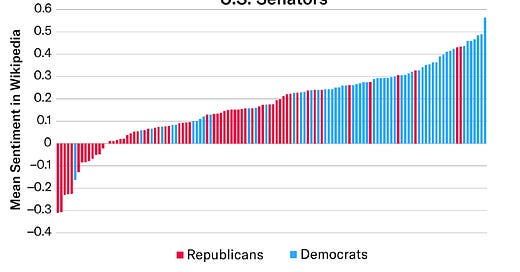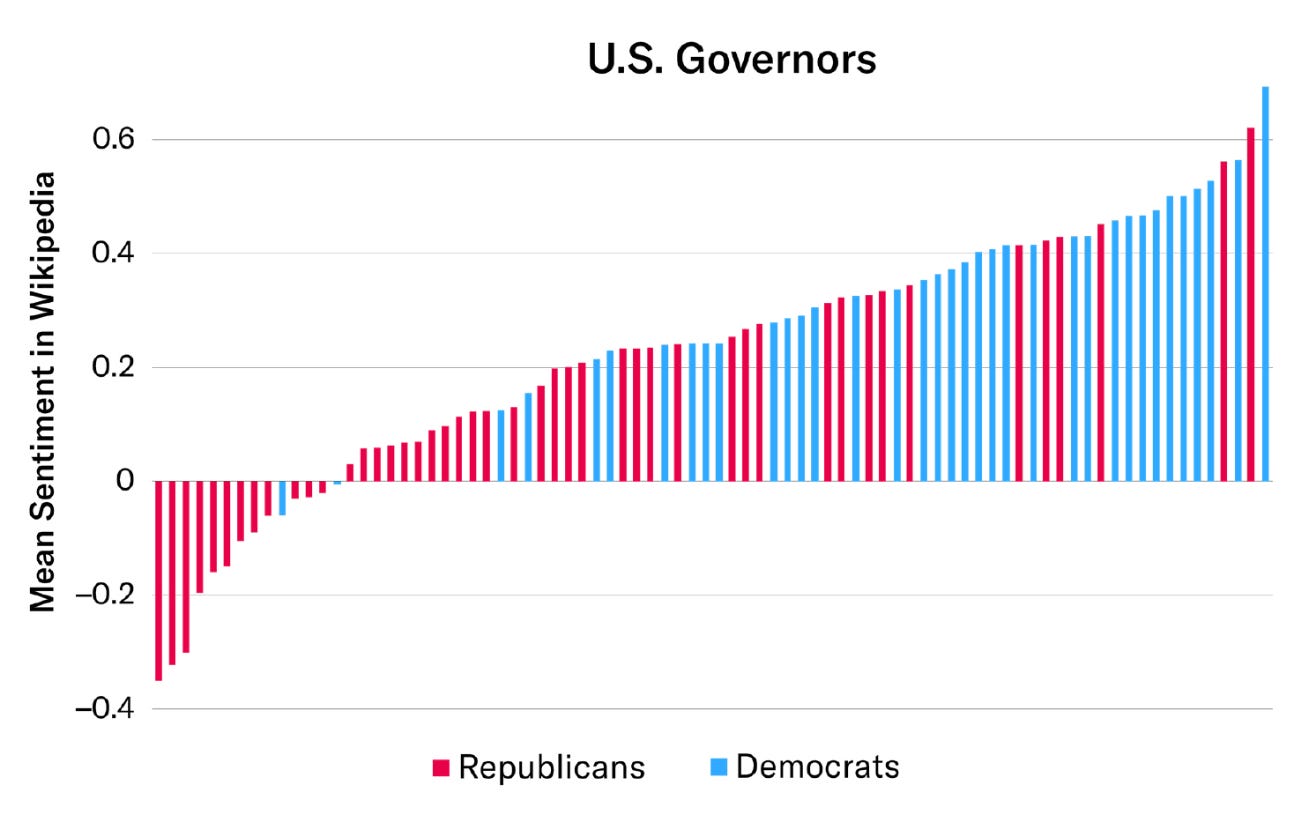Renewing America
Political bias in Wikipedia, James Davison Hunter on the negative world, and more in this week's roundup.
Note: There will be no digest next week due to the July 4th holiday.
I was a guest on the Realignment Podcast this week, talking about sources of renewal in America. We discuss my observation that the most likely source of policy renewal is what I call the non-woke, neoliberal, technocratic center-left. This isn’t necessarily my preferred source, just what I see as most likely. We also talk about populism, why there seems to be a new elite consensus that reform is needed, and more.
I also have a piece this week in American Compass about how the narrative of red state policies producing growth is too simplistic.
Wikipedia’s Political Bias
David Rozado at the Manhattan Institute has a great study on political bias in Wikipedia.
The goal of this report is to complement the literature on Wikipedia’s political bias by using a novel methodology—computational content analysis using modern LLMs for content annotation—to assess quantitatively whether there is political bias in Wikipedia’s content. Specifically, we computationally assess the sentiment and emotional tone associated with politically charged terms—those referring to politically aligned public figures and institutions—within Wikipedia articles.
…
In general, we find that Wikipedia articles tend to associate right-of-center public figures with somewhat more negative sentiment than left-of-center public figures; this trend can be seen in mentions of U.S. presidents, Supreme Court justices, congressmembers, state governors, leaders of Western countries, and prominent U.S.-based journalists and media organizations. We also find prevailing associations of negative emotions (e.g., anger and disgust) with right-leaning public figures and positive emotions (e.g., joy) with left-leaning public figures. In some categories of terms, such as the names of U.K. MPs and U.S.-based think tanks, we find no evidence of a difference in sentiment.
Here are a couple of charts to illustrate.
James Davison Hunter on the Negative World
Sociologist James Davison Hunter is a very smart and insightful person. He has a new book out called Democracy and Solidarity: On the Cultural Roots of America's Political Crisis, which I’m very surprised has not gotten more attention. I am planning to read it and provide more coverage.
Religion Watch interviewed him about the book, and asked him what he thought about the idea of the “negative world.” Hunter is a potentially fearsome critic. He’s a person who might well have been able to come up with a much more compelling framework, one that he might have even published 20 years ago that people just don’t know about. But here is what he had to say:
RW: In evangelical circles, one hears much about how conservative Christians are now living in a “negative world,” where older forms of tolerance and neutrality toward Christianity have been replaced by hostility. Do you see this taking place as the culture wars have intensified?
Hunter: There is no question that American public life has become less congenial to American evangelicals, and in a way this is new. Hostility toward religion as expressed, say, in French anti-clericalism was never a prominent feature of American intellectual life or elite culture. But it has become so in the last several decades. The consequence of this has been a marginalization of Christianity in America—full stop. This is especially seen in the stigmatization of Christianity and of Christians themselves within the leading institutions of cultural formation—intellectual life, higher education, the arts, journalism and the news media, popular entertainment, advertising, and so on.
But if we’re honest, evangelicals were a prominent source of the reigning culture of negation. Christians sought to resist what they have seen as the decline of American society—which was really a transformation from modern to late modern culture—by going negative on “secular humanism,” feminism, gay rights, and so on. In other words, the cultural ground beneath their feet had shifted. America had become post-Christian on its way to becoming post-liberal. Christians reacted by trying to keep America “Christian” and using political means to do so. In short, they were, and still are, trying to use the coercive power of the state to achieve cultural ends. It not only generated a new and deeper hostility among their opponents, but it is a strategy that is guaranteed to fail. Politics can never do the work of culture.
I’m gratified that he shares my basic analysis of current cultural conditions.
While I do not agree with the idea, espoused by some other people, that evangelicals caused the Negative World, I think Hunter’s observations about evangelicals’ own behaviors and the limits of culture war politics need to be taken seriously.
As I noted in my piece about the Louisiana Ten Commandments law, acts of this nature are practically calculated to polarize and offend. If you take provocative actions, don’t be surprised if people are provoked. That doesn’t mean that we should never do controversial things. There’s a place for confrontation and provocation. But we have to accept the consequences of those actions as well. And we have to move beyond the old tactics of the culture war, which on the whole simply did not work, even when the church was in a much stronger position than today.
If you haven’t read it yet, be sure to pick up your copy of Life in the Negative World: Confronting Challenges in an Anti-Christian Culture.
Best of the Web
NYT: I Was Content With Monogamy. I Shouldn’t Have Been - In which the Times combines two of its favorite topics: polyamory and exvangelicalism.
When my wife proposed that we stop being monogamous, she said it would make us stronger. I said it would make us divorce. We were both right.
She had planted the seed seven years into our marriage as I was finishing seminary. At the time, I was exiting a phase of my life perhaps best described as “worship pastor bro.” My Christian faith was undergoing a meticulous and scholarly deconstruction. I could begin to imagine a life without God, but with my new, expensive master’s degree in theology, I struggled to imagine a career without Him.
By contrast, Corrie’s turn away from religion a year earlier had been quick, uncomplicated and annoyingly joyful.
NY Post: Influencer and OnlyFans model contacted by 5,000 single men after posting boyfriend application, rejects them all - Looks like the Good Men shortage strikes again….
Regan Arnzt-Gray: Let's be honest about the “second shift”
But while it’s true that women do more household and childcare work, data from the American Time Use Survey indicates that the total amount of time spent working (which includes time spent on paid work, household tasks and childcare) is nearly identical for men and women, with men actually working slightly more than women…And if we look at the average data from 2015-2019 for married parents who both work full time, men still work slightly more in total even though women do significantly more household work and childcare.
Matthew Yglesias: Elite misinformation is an underrated problem - Important institutions are too eager to mislead people
The Worthy House: Against Nostalgia
Total failure will always be the final state of political action centered around nostalgia. The arrow of history points in no particular direction, but it never points backward. Attempts to recapture the past inevitably result in flailing, self-destructive political action, as we attempt to force reality into a mold that was long ago broken. At best, the result is a baroque, calcified structure that soon collapses of its incoherencies, leaving everyone worse off than before. As L. P. Hartley famously said, the past is a foreign country, they do things differently there. And they always will. All that is possible is to create a new thing for a new time. We can never recreate the past.
The New Yorker reviews Charles Taylor’s new book Cosmic Connections.
New Content and Media Mentions
New this week:
Most podcast was an interview with Batya Ungar-Sargon on her book Second Class.
At American Compass, I wrote about how tax cuts are not a magic bullet for red states.
I argue that Louisiana was unwise to mandate the display of the Ten Commandments in school classrooms.
And guest writer Benjamin Mabry writes a piece against the “antis”, arguing that we need to be for things, not just against things.







The Hunter book sounds interesting. Will look forward to updates on that.
On the polyamorous exvangelical -- as a student of human nature, I always try to figure people like this out, because I don't know anyone like this: went to a conservative Bible school, got married (apparently waiting until marriage to have sex), had kids, then went completely off the rails around 6 years later. Normally when a sheltered kid goes off the rails, it's in college, not years after graduation, marriage, and kids.
I think this is his ex-wife by the way:
https://www.linkedin.com/in/court-bilbrey-lcsw-83308a59/
Could we have predicted this was her path if we had known her in college? I suspect yes, but I still wonder what they were like, and what caused them to apparently stay on the path so long before swerving off it.